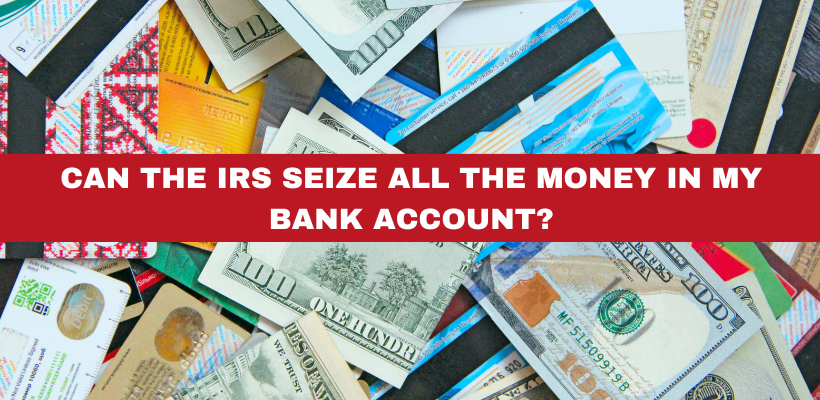Many taxpayers worry about whether the IRS can take all the money in their bank accounts if they owe back taxes. The short answer is YES, the IRS can seize all the funds in your bank account under certain conditions. However, there are legal procedures and protections in place that taxpayers should be aware of before panicking.
When can the IRS levy your bank account?
The IRS does not immediately seize money from your bank account when you owe taxes. Instead, they must follow a series of steps before taking such action. First, the IRS will assess your tax liability and send you a Notice and Demand for Payment (such as a CP14 or CP501 letter). If you fail to respond or make arrangements, they will then send a Final Notice of Intent to Levy (LT11 or CP90). This final notice gives you 30 days to take action before the IRS can move forward with seizing your funds.
During this period, you have the right to challenge the levy or negotiate a payment plan. If you do nothing, the IRS can issue a bank levy, instructing your bank to freeze the funds in your account. The bank will then hold these funds for 21 days before releasing them to the IRS. This 21-day window gives you one last opportunity to stop the levy by resolving your tax debt.
Can the IRS take all of the money in your bank account?
If you owe an amount equal to or greater than the balance in your bank account, the IRS can take the full amount. However, if your tax debt is less than what you have in the account, they will only seize enough to satisfy the debt. Importantly, a bank levy is a one-time action—it does not give the IRS ongoing access to your account. If you continue to deposit money after the levy, those funds will not be automatically taken unless a new levy is issued.
Some types of funds, such as Social Security benefits, may have limited protections if directly deposited into the account.
How to stop or prevent a bank levy?
If you receive a Final Notice of Intent to Levy, it’s crucial to take action immediately. The most straightforward way to stop a levy is to pay the tax debt in full, if possible. However, if paying the full amount isn’t an option, setting up a payment plan with the IRS can provide relief by allowing you to make manageable monthly payments instead of facing a sudden loss of funds. Another option is to request an Offer in Compromise, which lets qualifying taxpayers settle their tax debt for a reduced amount. If you are experiencing severe financial hardship, you can apply for Currently Not Collectible (CNC) status, which temporarily halts IRS collection efforts.
Taxpayers also have the right to appeal a levy if they believe it was issued in error or if they were not given proper notice. Requesting a hearing with the IRS Office of Appeals can potentially delay or stop the levy while your case is being reviewed. Taking proactive steps, such as negotiating with the IRS before a levy is issued, can prevent financial distress.
Final Thoughts
Yes, the IRS has the power to seize all the money in your bank account, but they must follow strict procedures before doing so. If you receive a notice about a pending levy, don’t ignore it. Taking prompt action can help protect your finances. If you’re facing an IRS bank levy, consulting a tax professional can be one of the best steps to take to resolve the issue and prevent further financial hardship.







 Steven N. Klitzner, P.A. is a tax attorney based in Miami, Florida. He has been practicing tax law for over 40 years, and currently holds a 10.0 rating by Avvo. Mr. Klitzner was appointed to the IRS Service Advisory Council in 2021 and is...
Steven N. Klitzner, P.A. is a tax attorney based in Miami, Florida. He has been practicing tax law for over 40 years, and currently holds a 10.0 rating by Avvo. Mr. Klitzner was appointed to the IRS Service Advisory Council in 2021 and is... 





